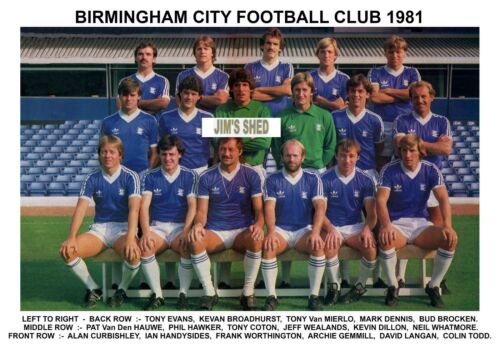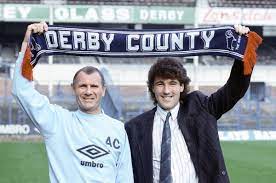26. May, 2022
DERBY COUNTY; RAMS RETURN TO ROCKY GROUND
Derby is a football city, Brian Moore stated as The Rams clinched promotion to The Premier League in 1995. Few would argue, Derby County were founder members of The Football League. Fifty Years ago they were Champions of England, adding a second title three years later. twice FA Cup Winners.
The unique Baseball Ground, home of Stamps, Doherty, Carter, McFarland, Clough and Taylor. Yet the Rams are currently experiencing a sequal of a less celebrated chapter of their colourful history.
Modern day County are a League One outfit, their predicament a result of financial rather then footballing failings. Former Chairman Mel Morris chased the dream and fell short. Morris certainly had good intentions, a Rams fan, he was brought up with the goals of Kevin Hector. While he was making his fortune in mobile phone games , the gangling legs of Paulo Wanchope were leading Premier League defences a merry dance.
Morris brought Derby County in 2014 He was hailed a messiah as Derby recovered from the disastrous 2008/9 Premier League campaign. The car crash season saw Derby win one game and register the paltry tally of 17 points, a record low in the English top flight.
Under Morris the Rams reached the brink of the promised land. Derby lost a Championship Play Off Final to Aston Villa. Big name managers Steve McClaren and Frank Lampard failed to deliver while the Derby County chairman decided to sell Pride Park to another one of his companies before loaning the stadium back to the football club, a move which contravened Football League fair play rules. Derby were found guilty and deducted 21 points. Despite a brave fight County were relegated. Little wonder manager Wayne Rooney cut a disillusioned figure on the touchline. Manchester United and England's Record goal scorer deserved a kinder baptism into football management.
However, Rooney may find solace in the fact that past Derby managers have fell victim to boardroom shortcomings. Early 1980'S incumbents Colin Adison John Newman and Peter Taylor were hampered by financial mismanagement. In 1980 the East Midlands club were relegated from the First Division, just five years earlier Derby were crowned Champions of England. Their second title in three years. The 1975 title winning side was managed by Dave Mackey. But the Scot was sacked the following year and the rot set in. Former Manchester United boss Tommy Docherty took over but the Rams star was fading fast. The Doc signed Gordon Hill and Gerry Daly from United, but the duo failed to rediscover their Old Trafford form. Docherty was shown the door and Colin Adison took the Baseball Ground helm. Adison had an impressive track record. In 1972 he led Hereford United to a famous FA Cup victory over Newcastle United. At the time Adison was Player Manager of the Southern League club. Those cup exploits saw Hereford gain election to the Football League in 1972. A spell as West Bromwich Albion's assistant gave Adison a taste of top flight football. The Baggies were flying under Ron Atkinson and Adison's reputation was further enhanced.
A bright young English manager offered hope of better times. Adison's Rams boasted the impressive performances of full back David Langan, midfielder Steve Buckley and striker Alan Biley. On their day County were a match for anyone. In December 1979 they hammered Nottingham Forest 4-1 in the East Midlands derby. The victory was particularly sweet as the auld enemy were reigning European Champions. but consistency alluded Adison's charges, relegation followed and Derby County were consigned to 8 years in the wilderness.
The expected instant return failed to materialize and the Rams next destination appeared to be Division Three. The shrewd management of Newman and Taylor kept heads above water. Once again there were false dawns. In January 1983 the Rams again beat Nottingham Forest in a FA Cup Third Round tie. Peter Taylor claiming a famous victory over Brian Clough. A year later they reached a FA Quarter Final, A Semi Final appearance looked on the cards when they were pitted against Third Division Plymouth Argyle, particularly when Derby earned a 0-0 draw at Home Park. However, Taylor's side were beaten 1-0 at The Baseball. To compound the misery Argyle's winner was scored direct from a corner..
Galling as the cup defeat was, the club faced a even bigger battle. In April 1984 Derby County Football Club faced a winding up petition. Plummeting attendances and an ill advised financial strategy (sounds familiar) resulted in the Rams original meltdown. Local Businessman and Derby fan Stuart Webb was the clubs savior. His consortium bought the club and installed Arthur Cox as manager. Cox had experience of reviving the fortunes of a fallen giant having recently overseen Newcastle United's promotion to the First Division.
But there was more misery to come, in 1984 Derby were relegated to the Third Division. Cox needed a talisman to restore faith Step forward Bobby Davison, a true Rams legend. The striker arrived from Halifax Town in 1982 and paid a pivotal role in County's revival. He scored 17 goals in the 1986/87 season as Derby finished 3rd in the Third Division. In those pre Play Off days a top three finish guaranteed automatic promotion. Davison and the Rams did not rest on their laurels the following season, he netted 19 times as Cox's side romped to the Second Division title. Once again the Baseball Ground would host First Division football.
Media tycoon Robert Maxwell had now taken over as chairman, Maxwell had helped save the club three years earlier. Like Cox, Maxwell had already transformed the fortunes of one club. As Oxford United chairman he had spearheaded the Us rise from Third Division to First Division.
In the late 1980's Robert Maxwell was one of the wealthiest men in Britain He was proprietor of the Daily Mirror newspaper, the jewel in the crown of a global empire. A fair percentage of his disposable income was invested in Derby. Armed with an impressive transfer kitty Arthur Cox was able to lure quality players to the East Midlands. England goalkeeper Peter Shilton and stylish defender Mark Wright were signed from Southampton. While Derby paid £1 Million for Oxford United striker Dean Saunders. The Welsh International (right) is pictured above with manager Arthur Cox (left)
The hefty expenditure paid off handsomely as Derby mounted a surprise title challenge in 1989. They finished 5th, their highest top flight finish in over a decade. Sadly English clubs were banned from European competition follow the Heysel Stadium disaster. So Cox's side were denied a place in the UEFA Cup.
Two years later County were relegated. Maxwell's empire suffered crippling debts leading to his mysterious death in November 1991. Daily Mirror employees saw their pensions evaporate putting Derby County's woes into perspective. Maxwell looted the pension pot to service debts and prop up an ailing share price.
Again the Rams bounced back. The financial backing of benefactor and Rams fan Lionel Pickering supporting the fine management of Jim Smith prompting a return to the Premier League.
Resilience is in the Derby DNA. Rooney will hope it resurfaces soon.

